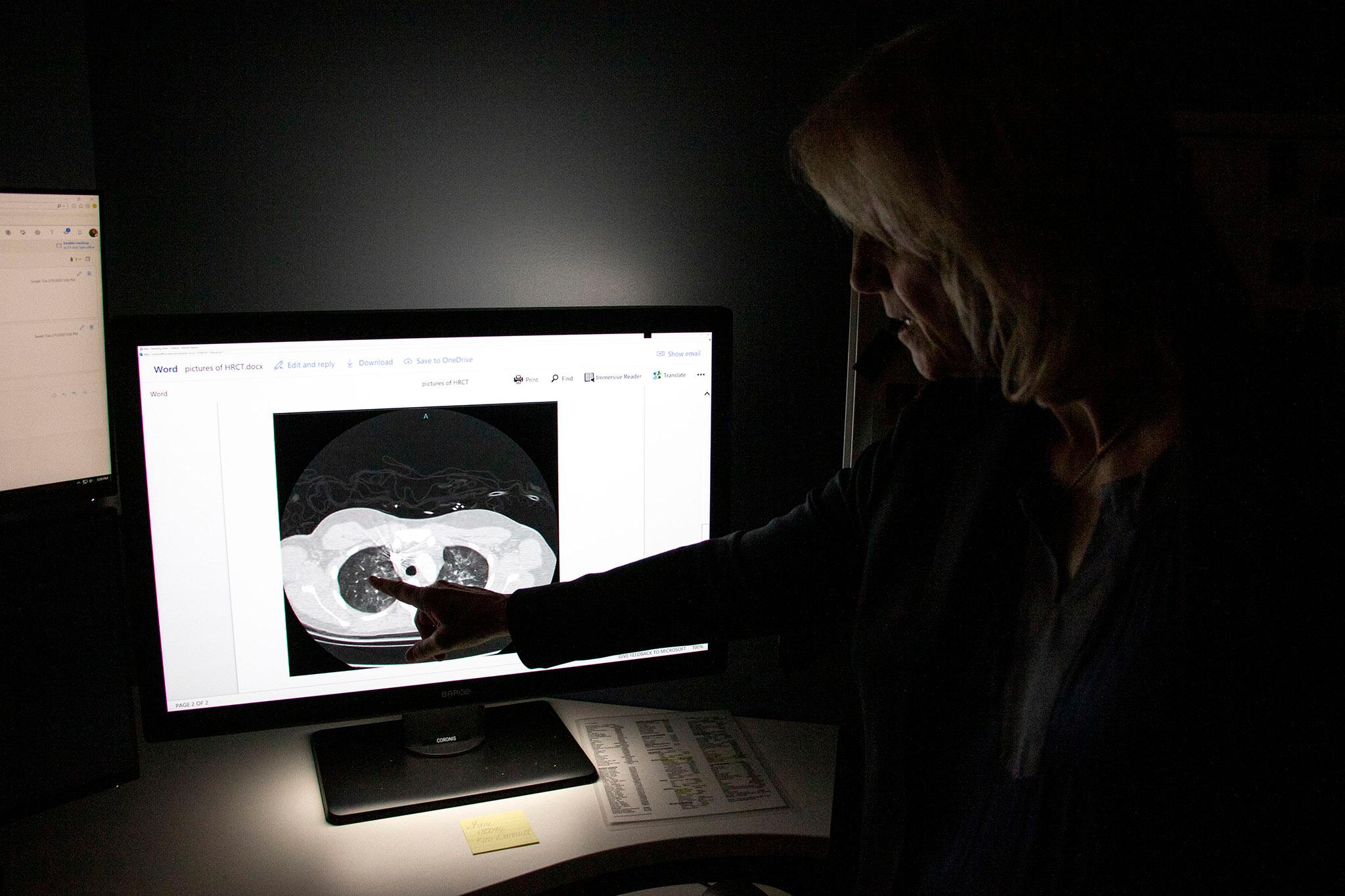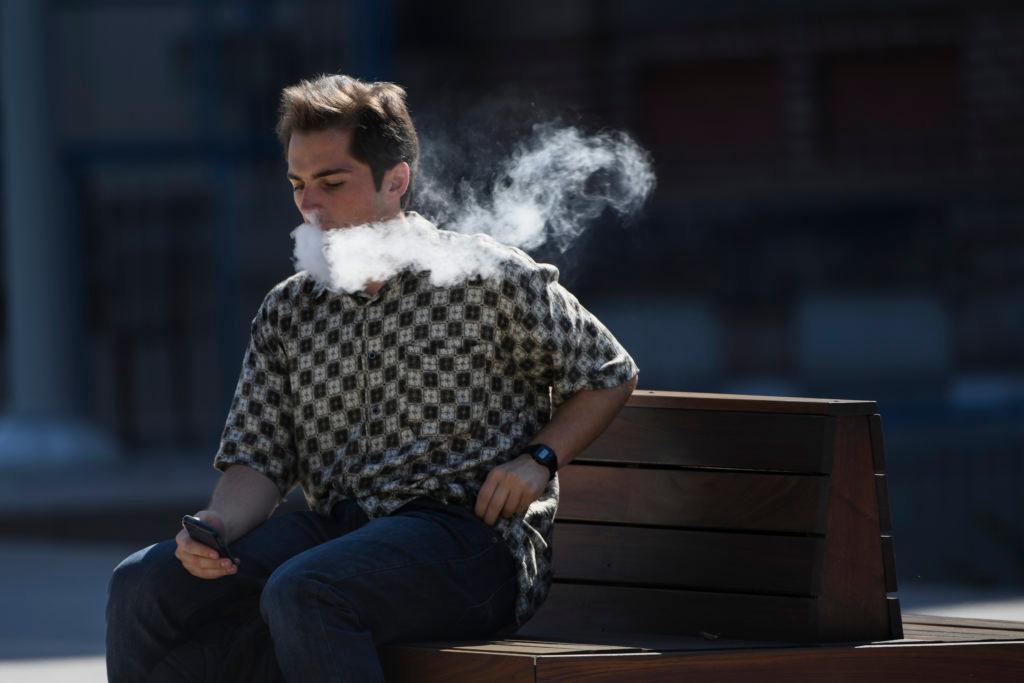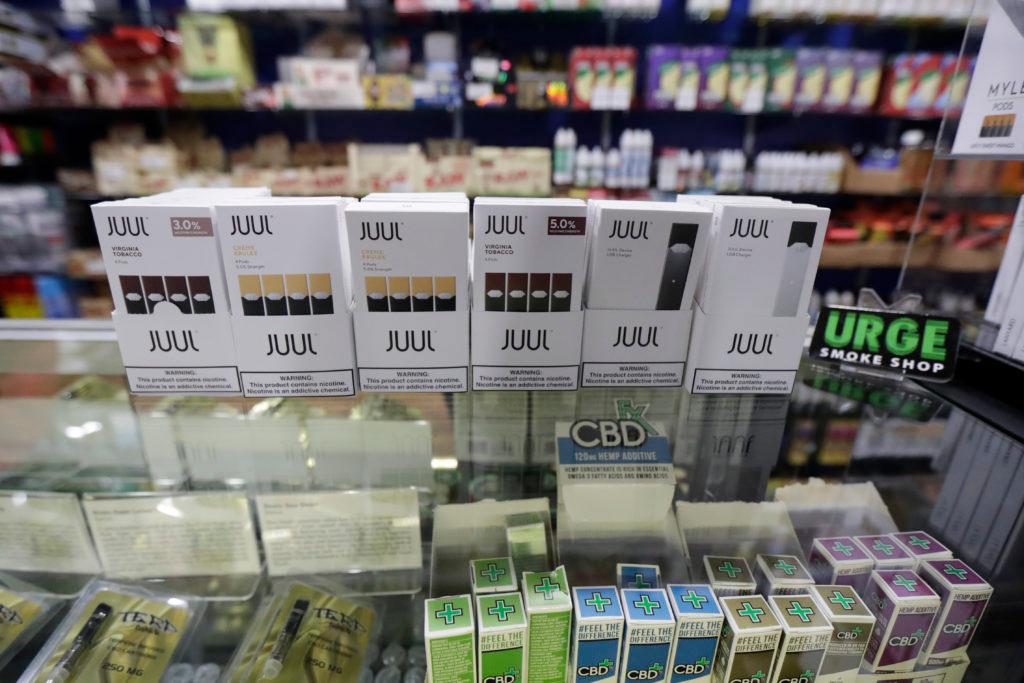
When the coronavirus started to take hold in Colorado, Kathleen Wilbur thought it was finally time to kick her vaping habit.
A mom of two adult sons who runs her own small business in Aurora, Wilbur has been smoking, and later vaping, on and off in bursts since her late teens.
She switched to vaping a couple of years ago, specifically the Vuse brand, to avoid the tar from smoking. She lost her “smoker’s hack,” and did try to cut down on vaping too, but she said she “used many excuses to go right back since.”
Then COVID-19 came to America.
Wilbur, 51, decided to quit vaping “in case I catch the virus,” she said.
“I don’t want to be behind the eight ball,” she said. It may not be enough, but she decided, “I'm going to (quit) for my family's sake.”
"So there's a better chance they won't have to grieve me. I'm going to step up to this,” Wilbur said.
Wilbur said she’s now gone five weeks without relapsing.
The rise of coronavirus in Colorado and around the U.S. has at least some people who vape or smoke reconsidering that habit, while others report feeling the need to do it even more.
Public health experts say it’s a good time to quit smoking and vaping.
While there’s still no research on the risks of vaping, initial studies from China found smokers were at higher risk of severe infection. Research published in the New England Journal of Medicine found coronavirus patients in China who smoked were more than twice as likely as those who didn’t to suffer from severe infections due to COVID-19.
Meanwhile, the vaping industry has pushed back on vape shop closures, and on suggestions to cut the habit.
People’s anxiety over nicotine consumption shows up in comments from callers to Colorado’s Quitline.
“I was looking at your site, so wanting to quit, especially now with all that is going on with the coronavirus,” a caller in their forties told a counselor. “I know it is the most stressful time to quit, but also the best time too.”
Thomas Ylioja, clinical director of the Colorado Quitline, says people who call or text the line are increasingly pointing to the COVID-19 outbreak as a motivation. He shared notes from communications between those looking to quit and counselors.
“I want my lungs to get healthier because of coronavirus. I don't want to be so at risk,” one person told a counselor.
An 18-year-old turned to the anonymous service too.
“I just can't go anywhere outside of my house because my parents don't know that I vape,” they said.
Ylioja didn’t know if more people were calling into the quit service.
“But certainly the people calling the Quitline are very anxious about the virus and want to quit to improve their health and decrease their chances of serious illness,” Ylioja said.
For others, though, the pandemic has proved a particularly challenging time to be dealing with substance use.
"It's already stressful enough living during a pandemic but to try to quit (smoking) is nearly impossible," said Jerimiah Stone, a smoker who lives in Denver.
He responded to a CPR call out to its audience on the topic. He said he didn't want to smoke right outside his building door because it's disrespectful to nonsmokers, and he didn't want to be near the door when a resident pops out without a mask on.
"It's really hard to smoke with a bandanna, and the trepidation of taking it off to smoke is difficult to deal with. I certainly don't want to die from (the disease), but quitting all but seems out of the question," Stone said.

Research on the overall health effects of vaping is years behind that of smoking.
But studies that are emerging paint a troubling picture, especially in two relevant areas: the lungs and heart.
Both tie into underlying conditions that may make someone more vulnerable to complications if they get COVID-19.
Many people believe when they vape they inhale harmless water vapor. But that aerosol can actually contain high concentrations of nicotine as well as particles linked to lung disease and cancer.
Doctors say that impacts the lungs, where those foreign substances can harm tiny, delicate airways, said Dr. Robin Deterding, the chief of Pediatric Pulmonary Medicine at Children’s Hospital Colorado.
Cigarettes can elevate blood pressure and heart rates and can cause vascular disease. Scientists don’t know if the same is true for e-cigarettes, but more and more studies are raising concerns. Research last year found adults using e-cigarettes had higher risks of heart attack and coronary artery disease compared with non-users.
A spokesman for the Food and Drug Administration told Bloomberg that vaping could put those with underlying conditions at higher risk of serious complications.
“This includes people who smoke and/or vape tobacco or nicotine-containing products,” FDA spokesman Michael Felberbaum said. “E-cigarettes can damage lung cells.”
In Colorado, about 30 percent of those identified with COVID-19 are between the ages of 20 and 40, according to the latest data from the state health department. The state has not yet released data about patients underlying health conditions.
Dr. Shen Nagel, a pediatrician who works at clinics in Littleton and Wheat Ridge, said he’s urged some patients to stop vaping.
“A couple independently brought it up as well. ‘Is this potentially hurting my lungs and making me more likely to get really sick, if I were to get coronavirus?’” Nagel said.
His message is that vaping could put young people at great risk if they get sick with COVID-19.
“By doing that you have the potential for underlying lung damage to begin with,” he said. “If you get a virus that is potentially very serious from a respiratory standpoint, it just makes you that much more prone to having more serious disease.”
Deterding said more research is needed, but that “this would be an excellent time to stop smoking and vaping.”
She said emerging data shows smoking and e-cigarettes impair genes that impact the immune system. Human studies have found vaping increases bronchitis, reducing one’s ability to cough, which in turn decreases the ability of tiny hair called cilia to clear mucus from the respiratory tract.
“COVID-19 creates inflammation and creates significant mucus in your lung, and you need all of these systems ready to go ... to be able to fight it,” Deterding said. “I think it's risky business to be vaping and smoking.”
She also pointed to a 2019 study on exposure to e-cigarette aerosol, although it was conducted in mice and thus not yet replicated in humans.
“Those mice were a lot less likely to survive. They got pneumonia much more commonly,” she said. "(Vaping) is a bad thing to do right now in general, but (it) certainly increases your risk, in my opinion, based on the data that we have.”
Anti-tobacco groups are pushing for better data on the possible link to COVID-19, at the national and state levels.
“We have reached out to the Centers for Disease Control and others who are collecting this data and urge them to collect very strong data on smokers, former smokers and e-cigarette users. Our hope is that they will begin to systematically collect that data,” said Matthew Myers, president of the Campaign for Tobacco-Free Kids. “But in the interim, we know clearly that anybody who has compromised lungs is at increased risk and we're no longer talking about long term risk. Here we're talking about very short term, very severe risks. There is no reason to take a gamble.”
Dr. Ken Lyn-Kew, a National Jewish Health pulmonary critical care physician who cares for adults, said the thinking is similar to why older people are more susceptible to COVID-19, that “they have a less robust immune response,” he said.
An inflammatory condition like that caused by the e-cigarette-related lung illness that led to more than 2,800 hospitalizations and 68 deaths in the last year, would dampen one’s immune response, although that illness was linked to a substance in some vaping products, especially illicit THC, not the practice overall.
“We know what vaping does to the lungs, and it would be something that should put people at risk for worse disease with COVID-19, even if they're young,” Lyn-Kew said.
The state led more than three dozen states surveyed in a 2018 study for use of electronic cigarettes among high school students. A quarter of those students said they currently used an electronic vapor product, double the national average. Almost 6 percent say they use them frequently.

Vape and smoke shops have had to close their doors under state stay-at-home orders.
Both liquor stores and marijuana dispensaries have been declared “essential” businesses, and thus can stay open. A trade group opposed the decision.
“If alcohol and recreational marijuana are essential services, we believe that responsible adult vaping consumption is an essential service too,” said Amanda Wheeler, vice president of the Rocky Mountain Smoke Free Alliance, in a statement.
She described it as a health issue, saying many vape shop customers are former combustible cigarette smokers looking for a healthier alternative to smoking. If vape shops stay closed, former smokers may end up buying cigarettes from convenience stores, she said.
Wheeler said most of the state’s vape shops, like many small businesses, have laid off staff, and many may not survive.
“It's a nightmare, our members (of the trade group) are struggling. They're struggling. We're having people that can't ride this out for much longer,” Wheeler said.
She’s hopeful that when the crisis subsides they’ll at least be able to offer curbside service, which she said is happening in a number of other states.
Wheeler is convinced consumers will find a way to buy vape products, potentially driving a black market.
“I see people posting all over these groups on Facebook with offers of black market products and facilitating these black market transactions,” she said.
E-cigarettes aren't approved by the FDA as a quit aid. Research about whether e-cigarettes can help people stop using tobacco have had inconsistent results, according to the Mayo Clinic.
Gov. Jared Polis told CPR’s Colorado Matters he was aware of data out of Italy showing smokers have a higher fatality rate from COVID-19. He said there’s no evidence that someone is more likely to contract COVID-19 if they smoke or vape.
“What there is very strong evidence of is that it is more likely to have severe symptoms and need medical intervention if you have diminished lung capacity or are an older resident,” Polis said. “For people who smoked for 20, 30 years, they have diminished lung capacity, and so they are at higher risk if they contract COVID-19.”
“We eagerly await any studies or information around the impact of vaping,” he said.
Last week, Maura Healey, the Massachusetts Attorney General, warned about potential elevated dangers and risks linked with smoking and vaping during the coronavirus pandemic.
Healey sent an advisory to medical professionals, educators and parent groups warning that smoking or vaping may place people into a higher risk category, make infections worse and help the spread of COVID-19.
“The threat of COVID-19 further highlights the dangers that e-cigarettes pose, especially to our young people,” Healey said in the advisory.
The American Vaping Association condemned the move as “political” and “shameful.” The group’s president Gregory Conley said there’s no evidence linking vaping to bad COVID-19 outcomes.
Lung illnesses and death last year were linked by the CDC “to illicit THC vaping products, not legal nicotine vaping products,” he said.
In New York, the epicenter of the pandemic in the U.S., a group representing family physicians called for a ban on all tobacco and vaping or e-cigarette products.
"Since smoking has been a demonstrated risk factor for COVID-19 disease progression, which leads to increased use of medical services, especially ventilators, our hope is that by reducing the number of smokers, we can further reduce the stress/demand on the already limited supply of medical resources, particularly ventilators," Dr. Jason Matuszak, president-elect of the NYSAFP, told AAFP News.
Others warn such a prohibition would be hugely controversial and send New Yorkers driving out of state to buy tobacco products. When states and local governments looked to a variety of bans in response to e-cigarette-related illnesses last year, concerns arose about the moves potentially fueling a black market for the products.








